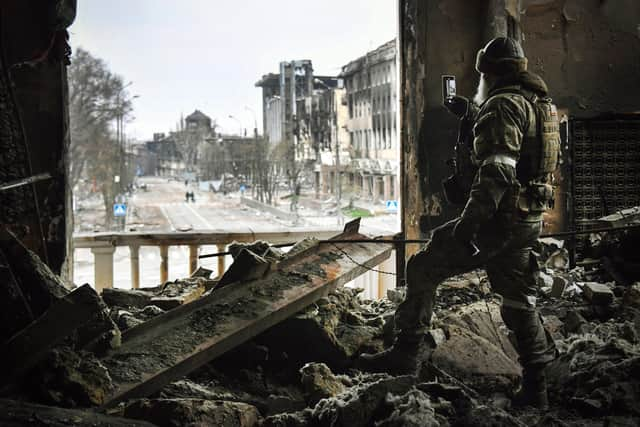Steve Aiken: The Russians are still not winning the war in Ukraine


Much of the later analysis, shows that there was a lack of understanding of the true capabilities of the adversaries, often confusing ‘force levels’ with the actual moral and conceptual levels of war fighting.
In the case of the Ukraine and its brave forces, the determination to fight, against seemingly overwhelming odds, against a seemingly unstoppable aggressor, will be seen as a case in point.
Advertisement
Hide AdAdvertisement
Hide AdOnly a few weeks ago, many of us thought that the battle for Kyiv was imminent and that the city would have been turned into a facsimile of Stalingrad. Instead, that horror has been visited on Mariupol.


Unexpectedly, the Russian Army has been defeated and forced to retreat from the capital; in the air they have failed to achieve dominance, and in what, surely, is a major dent to both the pride and morale of the Russian Navy, its Black Sea flagship, named after its capital city, has been sunk by a nation with virtually no navy.
Attacking cities and factories indiscriminately with missiles and the occasional artillery strike, cannot disguise that fact that in all the critical domains of air, land, maritime, cyber and the information space, Russia is not winning.
That, in itself, after close on two months of war, is a significant victory for the Ukraine — and a major headache for Vladiimir Putin and his general staff.
And time is running against him.
Advertisement
Hide AdAdvertisement
Hide AdMay 9, days away, is one of the significant dates in the Russian calendar; it is ‘Victory Day’, commemorating the defeat of Nazi Germany.
Putin had linked his invasion of the Ukraine to ‘de-nazification’, evoking a Great Patriotic War struggle.
For Russians of all persuasions, the patriotic defence of the Rodina, or Motherland, is a rallying point, that transcends virtually all else — but in using this as his main reason for his actions, Putin has set himself up for strategic failure; quite simply, he can no longer afford to lose.
After the defeat on the Kyiv front the Russian Army has sought to concentrate its forces, shorten its supply lines, re-equip and refocus onto more limited objectives, namely, seizing the Donbas region, and in so doing, seeking to destroy the bulk of the Ukrainian Army.
Advertisement
Hide AdAdvertisement
Hide AdWhile that may be their stated objective, personnel casualties, for even a fairly closed society like Russia, are deemed to be high; coupled with this, based purely on open source reporting, maybe up to 15-20% of Russia’s total combat power has now been attrited — for a country with numerous security challenges it is a loss rate that is unsustainable.
Furthermore, the atrocities being committed by Russian regular and irregular forces, are highly indicative of poor morale, bad leadership and indiscipline of its armed forces.
Another set-back on the battlefield could be fatal for more than just Russian pride and prestige.
Paradoxically, this increases risk of escalation. Russian desperation has set in.
Advertisement
Hide AdAdvertisement
Hide AdThe possibility of strategic failure, which many considered the Ukraine and President Zelensky’s fate less than 50 days ago, is now a very real scenario facing Putin.
The temptation must now be to escalate, rather than retreat, in the hope that Ukraine’s defence and Western resolve, will falter.
That is why US, UK and European leadership now needs to be reinforcing the Ukraine’s military ability to fight, but increasingly, also allow the Ukraine to have the ability to win; we cannot be cowed by the threat of Putin expanding the conflict, indeed we must be redoubling our efforts to message to both Putin and Russia, that there aggression will fail.
By strongly supporting Finland and Sweden’s membership of Nato, by backfilling Soviet era equipment from our Polish and other Allies, we can do much; however, the quickest way to indicate our collective resolve, would be to shut off Russia’s oil and gas revenue.
Advertisement
Hide AdAdvertisement
Hide AdGermany, as a so called EU leader, is markedly failing to do this.
This is in considerable contrast to the bravery taken by the Ukraine to stand up to dictatorship.
Chancellor Olaf Scholz, rather than Vladimir Putin, should be the one drawing the appropriate historic lesson as the May 9 anniversary draws near.
• Steve Aiken is a former leader of the Ulster Unionist Party and a candidate for the party in South Antrim in today’s Stormont election. He is a former commander of a Royal Naval nuclear submarine
Advertisement
Hide AdAdvertisement
Hide AdSteve Aiken March 17: Kyiv is the critical battle in the Ukraine war
• Other opinion pieces:
Editorial on election day: Transferring fully within unionist candidates is vital today
Ruth Dudley Edwards May 3: Vote down the ballot for the good guys, so that SF lose
Owen Polley May 2: Underwhelming campaign hasn’t given NI Protocol the focus it need
Advertisement
Hide AdAdvertisement
Hide AdBen Lowry April 30: NI’s place in UK is under relentless pressure so a big unionist vote in this election is essential
Analysis Gerry Lynch May 4: Unionist transfers to SDLP and Alliance would cost SF seats
Editorial May 3: A high unionist turnout is essential in this election
Advertisement
Hide AdAdvertisement
Hide AdEditorial April 30: Donaldson remark on crucial nature of election shows need for big unionist vote